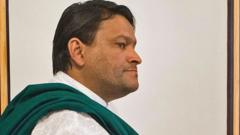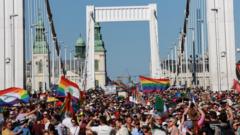Muhsin Hendricks, the first openly gay imam, was tragically killed in South Africa, prompting concern over safety in the LGBTQ+ community while simultaneously invigorating their quest for acceptance within religious settings. Despite staunch opposition from conservative Islamic groups, Hendricks is celebrated for pioneering a reconciliatory approach to faith and sexuality.
The Impact of Muhsin Hendricks' Legacy on LGBTQ+ Rights in Faith Communities

The Impact of Muhsin Hendricks' Legacy on LGBTQ+ Rights in Faith Communities
The assassination of South Africa's first openly gay imam, Muhsin Hendricks, sparks LGBTQ+ community fears and promotes continued advocacy for inclusivity in religious circles.
The recent execution-style killing of Muhsin Hendricks, South Africa's first openly gay imam, has sent shockwaves through the LGBTQ+ community, highlighting ongoing concerns about safety and acceptance within religious circles. Hendricks was shot dead in Gqeberha while reportedly officiating the marriages of two interfaith heterosexual couples, reflecting his commitment to inclusivity even up to his final moments.
Reverend Toni Kruger-Ayebazibwe, an openly gay Christian cleric, remarked on Hendricks' impact, describing him as a "gentle spirit" whose absence will be deeply felt among grieving queer Muslims worldwide. His Al-Gurbaah Foundation confirmed the details surrounding his death, emphasizing his role as a figure who continually pushed boundaries within his faith.
South Africa is notable for its progressive stance; it was the first African nation to legalize same-sex marriage in 2006. Despite this progress, conservative religious institutions, including the Muslim Judicial Council (MJC) and the United Ulama Council of South Africa (UUCSA), have distanced themselves from Hendricks, labeling him a pariah and using his surname instead of his religious titles. This action demonstrates the ongoing struggle for acceptance within certain religious communities.
Hendricks' significance is further emphasized by his efforts to establish The Inner Circle, a support system for queer Muslims that promotes the reconciliation of their faith with their sexual orientation. His life journey, which included coming out as gay after initially being in a heterosexual marriage, resonates with many who find themselves marginalized within their faith.
Even as LGBTQ+ acceptance grows among some South African religious groups, many still adhere to traditional interpretations of sacred texts that condemn homosexuality. Reverend Ecclesia de Lange noted that while policy changes in organizations like the Dutch Reformed Church and the Methodist Church of Southern Africa signify progress, there remains a strong conservative resistance, complicating the ongoing battle for acceptance.
Dr. Fatima Essop, an Islamic Studies lecturer, lamented the hateful rhetoric circulating online following Hendricks' death. She emphasized that such violence is not justified by any interpretation of Islamic teachings based on compassion and respect for life.
While the motive behind Hendricks' killing remains unclear, the aftermath has introduced considerable fear among LGBTQ+ individuals regarding their ability to express their identities openly. Still, despite the chill of insecurity, community leaders like Reverend Kruger-Ayebazibwe assert that Hendricks' legacy will serve as a catalyst for future advocacy.
Hendricks was laid to rest soon after his death, but plans for a memorial service are underway to honor his contributions to the fight for LGBTQ+ rights within Islam. Teboho Klaas of The Other Foundation believes that while Hendricks' life was tragically cut short, his work has created ripples that will continue to influence future generations in the struggle for acceptance and equality.






















